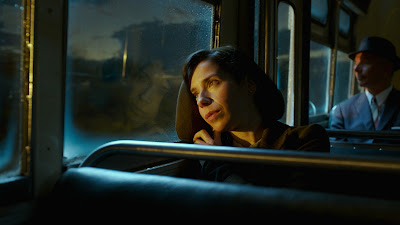Illegal Being
Illegal Being - A Distant Future Not So Distant
If Look What I've Got In My Shopping Bag was the birth of a new talent, Illegal Being is the maturation of that talent. Far from giving us any disappointments, Matthew Reynolds reveals that his talent wasn't just beginner's luck in Some Guys With a Camera's most ambitious project to date, being able to execute it and revealing a versatility in genres and themes. In a brilliantly written film that englobes political satire, romance, and Lynchian imagery, Reynolds proves that he's a very promising filmmaker of our Generation Z. This is an extremely important and original look at our current political climate, where we see a world where the word "alien" employed by so many conservative politicians is a bit more literal. Through this, we are shown an intelligent satire that will grip you from beginning to end and make you think. This is a film about a distant future that may not be as distant as it may seem. And this film is all the more important because of that.
This film could be divided into two distinct parts or storylines that eventually converge into each other: one being a political satire and the other being more of a romance. We follow each storyline interchangeably until they converge into each other.
The first one, as I said, is a political satire, and an extremely well-written one. We follow the quest for making Great Britain 100% alien-free of newly elected British Prime-Minister Michael Crank - portrayed so brilliantly by John Reynolds, in an extremely funny performance that mimics perfectly the ridicule of many modern populist politicians, doing an amazing job in creating a hateful yet hilarious character (mostly because of the accent he developed especially for this role) - and his central committee, composed of his stepsister Margot Crank and childhood friend Eddie Epstein - played by Elle Hazlett and Daniel Edwards, respectively, both giving great supporting performances. What is so brilliant about this storyline is the fact that it's both told through the lenses of news media and through what is happening in the backstage of Crank's administration (or mis-administration). This section of Illegal Being is also extremely intelligent in its references to contemporary politicians and the current political climate in the UK (and Europe) making it not an unrelatable and distant dystopia but a very modern take on politics. This section also has amazing supporting performances from Harry Privett - who lays Sir Rupert Clifford-Richards, the Home Secretary of Mr. Crank, in an absolutely hilarious performance that will have you in stitches - Benji Holmes - who played Fred McCartney, an alien rights activist, also doing a hilarious performance - and Matthew Reynolds himself - who plays Pete Plemons, a political comedian who opposes Crank.
The second storyline of the film is more of a romance, but it's also something more than that. We follow an alien whose ship has fallen on Crosby Beach, near Liverpool - portrayed exceptionally by Conor O'Neill, maybe the best performance of the film, in such a nuanced performance that gives so much depth to the character, keeping it from falling into a caricature - and Heidi, a Liverpudlian girl who finds him - played by Maria Taggart. Although this section has a promising concept behind it, I felt that the execution lacked something and the screenplay lacked the charm and intelligence present in Crank's storyline. In its use of a romance, it loses a bit of its originality, indulging in a clichéd romantic story that seems a bit off-beat in the atmosphere crafted in the film, with many aspects leaving me thinking that they were a bit unnecessary or poorly executed - maybe this is something still to be mastered by Reynolds. Another aspect I disliked about this part was Taggart's performance, which I found a bit mediocre and even a bit wooden, especially in comparison with O'Neill's. I feel that this romantic dimension given to this section was probably intended as a way to make us connect more with the peril faced by the Alien, but I felt that it fell a bit flat, failing to accomplish that connection through it, making the romance feel out of place and unnecessary. However, despite this, both Reynolds and O'Neill are able to make us connect and empathize with the Alien, especially through his pathos as a persecuted minority, which is portrayed exceptionally well by O'Neill's performance and through the sympathetic eye of Reynolds, making this section of the film much more enjoyable once we get past the romance. In fact, I thought the most visually stunning scenes were in this storyline, with impressive and beautiful color palettes. My personal favorite scene of this film is also in this section: the scene where the Alien discovers music, which is a brilliant and moving scene where everything seems to fall into place, cinematography-wise, score-wise, direction-wise, and performance-wise, and where a gem of a scene materializes before our eyes.
Considering that this film was done in a zero-budget, on a technical level everything is brilliantly done and impressively done. It has incredible editing - although sometimes a bit faulty in transitions between scenes with Crank and scenes with the Alien - awesome score (by Sam Low and Gabriel Ness, and with original songs by Benji Holmes), and astonishing cinematography that ranges from dull yellow tones that dominate the Crank section of the film to dark psychedelic blue-ish tones in the Alien section of the film, especially in an extremely well-crafted scene that consists of a long take of about 6 minutes in Crosby Beach, which is extremely impressive for a young director like Reynolds.
All in all, despite its flaws, Illegal Being is a masterpiece of zero-budget cinema and is an extremely important film that brings a fresh voice to the world. Cinema has an incredible potential to give a voice to the ones who are voiceless that no other art form has, and that is exactly what this film accomplishes. Through an allegorical dystopia, we are led to better understand the situation and point of view of immigrants and refugees that are being so targeted by populist politicians all over the world. With imagery that resonates a lot with David Lynch's cinema yet has a lot of its own original and independent aesthetic and with a poignant and visually striking ending, this is an immensely unique experience and I can't wait for whatever comes out of Matthew Reynolds' mind next.
Illegal Being premiers on the 24th of December on Some Guys With a Camera's YouTube Channel.
Illegal Being premiers on the 24th of December on Some Guys With a Camera's YouTube Channel.




Comments
Post a Comment